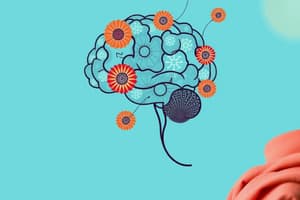Podcast
Questions and Answers
What is the primary function of dendrites in a neuron?
What is the primary function of dendrites in a neuron?
- To transmit messages away from the cell body
- To support the neuron structurally
- To receive messages and conduct them toward the cell body (correct)
- To form synapses with other neurons
Which type of neurotransmitter inhibits the firing of neurons?
Which type of neurotransmitter inhibits the firing of neurons?
- Inhibitory neurotransmitter (correct)
- Antagonist
- Agonist
- Excitatory neurotransmitter
What is the role of the sympathetic nervous system?
What is the role of the sympathetic nervous system?
- To regulate the self-controlled actions of internal organs
- To control voluntary movements of skeletal muscles
- To prepare the body for arousal and stress responses (correct)
- To facilitate calming processes in the body
Which part of the brain is primarily responsible for coordinating and regulating motor functions?
Which part of the brain is primarily responsible for coordinating and regulating motor functions?
What type of neurotransmitter is known to promote the firing of neurons?
What type of neurotransmitter is known to promote the firing of neurons?
Which lobe of the brain is most involved in executive functions such as planning and judgment?
Which lobe of the brain is most involved in executive functions such as planning and judgment?
What defines the synapse in the context of neuron communication?
What defines the synapse in the context of neuron communication?
Which component of the nervous system includes both the autonomic and somatic systems?
Which component of the nervous system includes both the autonomic and somatic systems?
What is the primary focus of structuralism in psychology?
What is the primary focus of structuralism in psychology?
Which psychological approach emphasizes the impact of unconscious experiences and early childhood?
Which psychological approach emphasizes the impact of unconscious experiences and early childhood?
Which branch of psychology is primarily concerned with the diagnosis and treatment of psychological disorders?
Which branch of psychology is primarily concerned with the diagnosis and treatment of psychological disorders?
The Five Factor Model in personality psychology is used to describe what?
The Five Factor Model in personality psychology is used to describe what?
What is a major distinction between correlation and causation?
What is a major distinction between correlation and causation?
What does cognitive psychology primarily study?
What does cognitive psychology primarily study?
Which approach in psychology studies how individuals relate and interact with others?
Which approach in psychology studies how individuals relate and interact with others?
What does biopsychology explore in relation to behavior?
What does biopsychology explore in relation to behavior?
Study Notes
Chapter 1: Introduction to Psychology
- Structuralism: Founded by Wilhelm Wundt; focuses on understanding conscious experience via introspection.
- Introspection: Self-examination of conscious experience to identify its components.
- Psychoanalysis: Emphasizes the unconscious mind and childhood experiences in shaping behavior.
- Behaviorism: Centers on observable behaviors and methods to modify them.
- Humanistic Psychology: Introduces a hierarchy of human needs that motivate behavior.
- Developmental Psychology: Studies physical and mental growth throughout the lifespan and skills acquired during maturation.
- Cognitive Psychology: Investigates internal mental processes such as perception, memory, and decision-making.
- Social Psychology: Analyzes interpersonal relationships and group dynamics, including prejudice, attraction, and obedience.
- Clinical Psychology: Involves the diagnosis and treatment of psychological disorders and maladaptive behaviors.
- Personality Psychology: Explores individual behavior patterns; includes the Five Factor Model.
- Five Factor Model: Describes personality traits on a continuum; each factor has high and low scoring characteristics.
- Hypothesis Testing: Formulates predictions (if-then statements) that are falsifiable.
- Correlation vs. Causation: Correlation does not imply causation; only experimental design can establish cause-and-effect relationships.
Chapter 3: Biopsychology
- Biological Psychology: Examines biological foundations of behavior, including genetics, the nervous system, and the endocrine system.
- Neurons: Basic units of the nervous system that transmit information.
- Dendrites: Extensions of neurons that receive signals and carry them to the cell body.
- Axon: Transmits messages away from the neuron to other neurons or cells.
- Synapse: The connection point between the sending neuron's axon and the receiving neuron's dendrite or cell body.
- Neurotransmitters: Chemicals that facilitate communication between neurons.
- Excitatory Neurotransmitters: Promote neuron firing (e.g., glutamate).
- Inhibitory Neurotransmitters: Prevent neuron firing (e.g., GABA).
- Agonist: Enhances or mimics neurotransmitter effects.
- Antagonist: Blocks or reduces neurotransmitter effects.
- Endocrine System: Regulates hormones and bodily functions alongside the nervous system.
Nervous System Overview
- Central Nervous System (CNS): Comprised of the brain and spinal cord.
- Peripheral Nervous System (PNS): Divided into autonomic and somatic nervous systems.
- Autonomic Nervous System: Controls involuntary bodily functions; further divided into:
- Sympathetic Nervous System: Stimulates fight-or-flight response.
- Parasympathetic Nervous System: Calms the body and conserves energy.
- Somatic Nervous System: Manages voluntary muscle movements and sensory information.
- Autonomic Nervous System: Controls involuntary bodily functions; further divided into:
Brain Structures and Functions
- Cerebellum: Coordinates various functions; contains a large number of neurons despite its small size.
- Limbic System: Mediates emotions and memory; situated between older brain regions and the cerebral hemispheres.
- Amygdala: Processes emotions and emotional memory, notably fear.
- Cortex: Surface area responsible for high-level mental functions; includes:
- Frontal Lobe: Handles executive functions (planning, reasoning), motor control, emotion, and language; home to the motor cortex and Broca’s area.
- Parietal Lobe: Processes sensory information and perceptual input.
Studying That Suits You
Use AI to generate personalized quizzes and flashcards to suit your learning preferences.
Related Documents
Description
Prepare for Exam 1 with this review on the Introduction to Psychology. Explore key concepts such as Structuralism, Psychoanalysis, and Behaviorism, focusing on their definitions and implications in understanding human behavior. This quiz will help reinforce your knowledge of essential psychological theories.




